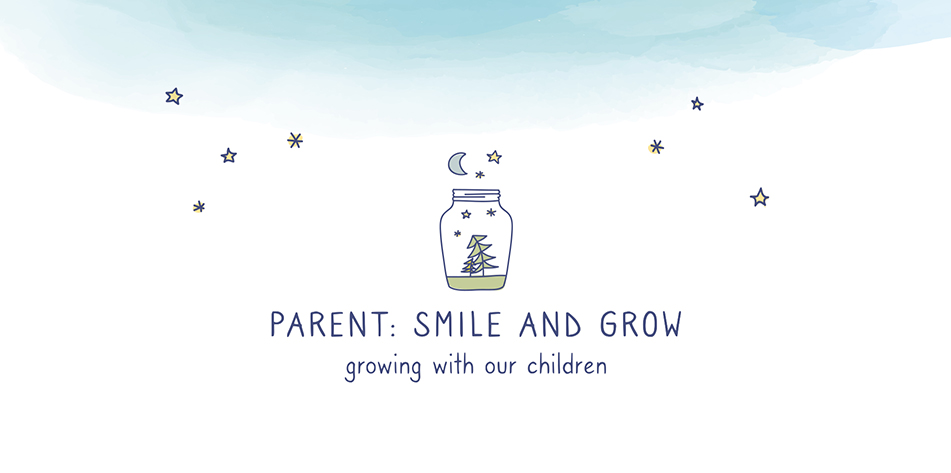Why should we talk about stress for newborns? Even if you’re not pregnant and maybe your kid is now a teen? For the third episode of this series about stress, I’m particularly keen to start from the beginning. Because even babies get stressed (and a lot); and the way we support them determines the formation of the fundamental mental structures that will help them face life even as adults. This is stuff that’s worth learning, and spreading to future generations!
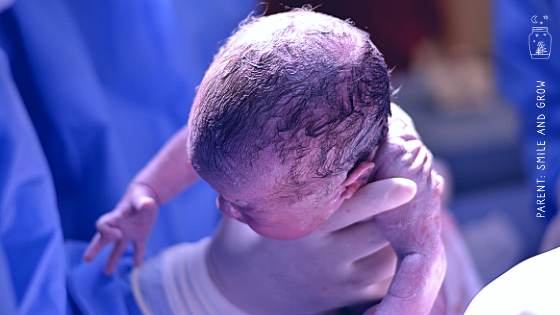
Table of Contents
Why talking about stress for newborns and babies?
I didn’t know anything of what I’m about to write today when I first became a mom.
I was happy and naive, convinced that I would make my mistakes in the best possible way.
My instinct suggested me how to react; but then there were many other voices that rose louder:
“You’re going to spoil her!”; “You don’t want her to get used to it?” “You’re too good/ too patient / miscellaneous.”
And then, tiredness; sometimes, the loneliness of misunderstanding.
I hope I didn’t do any serious damage, but at the same time I keep telling myself: “If only I had known before!”
So, future babies, moms, you dads who have such an important role but you don’t always know. These lines are for you.
If you’re thinking that this doesn’t concern you, and you’re going to click elsewhere (because I know that time is short and precious, and the attention span on the internet lasts a few seconds). Hold on.
Who you are today depends at least in part on those first few months with your parents.
#1: Parents form their babies’ brains
At birth, a newborn’s brain has about 100 billion neurons. And this is just the beginning.
This choice is biologically deliberate: human beings are born ready to adapt to any social environment that will welcome them.
The brain, in short, is built on the basis of the baby’s experiences.
The first months and years, synapses (i.e. connections between neurons) increase a lot, while connections that are no longer used are quickly eliminated to make room for new ones. (That’s why up to the age of 3 children quickly forget about people and events if they are not repeated enough times.)
And what constitutes the main experiences of a newborn? His parents. Through the senses.
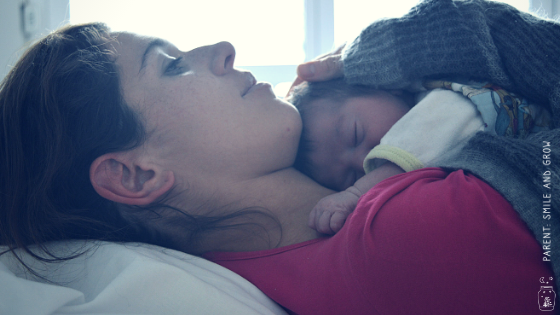
Newborns are equipped to use their senses since birth:
- smell – they recognize the smell of mom and milk
- touch – they feel the presence of the parent with their whole body
- hearing – already recognize the voice of their mom and her heartbeat (that’s why we tend to breastfeed first from the left breast..)
Do you remember that feeling of deep calm, those first few hours when you held your creature? Didn’t it seem that the world was standing still, that there was only you in that hospital room that suddenly became a soap bubble?
At some point, even the most resistant bubbles burst.
(You may also be interested: Cuddles as a remedy meltdowns)
What is stress for a newborn
We have seen what stress is, its long-term effects and how we sometimes create highly stressful situations for ourselves (high cortisol).
It seems absurd to think that newborns and stress can be connected whatsoever, right?
If I say “Stress,” you’re probably thinking about the next big meeting, the pay rise you want to ask for, how to announce your pregnancy without risking losing your job (although this shouldn’t happen anymore?)
Let’s take up the definition of stress:
“When we are exposed to any internal or external element, that offsets our physiological or psychological balance”
Now think about your newborn baby. How he completely depends on you for survival.
Any stimulus could potentially put him in danger, because he doesn’t yet know what’s really dangerous and what’s not.
He can’t interpret the world, and can’t find any solutions to threats or problems.
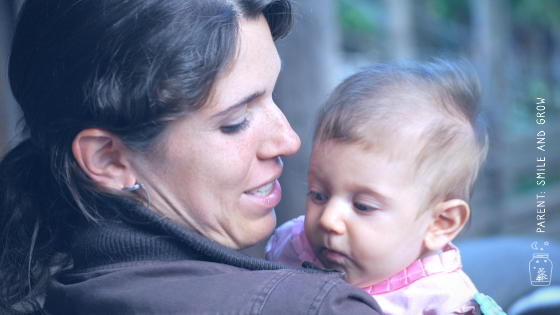
#2: Babies get stressed too!
Let’s put it this way: for at least the first two months of life, every time something happens (a sudden noise, a smile, the feeling of hunger..) the balance of the newborn is put off-balance. Your reaction (or lack of reaction) sends key signals to the baby’s brain.
His nervous system has no other elements to interpret the stimulus than that given by the parent.
The parent smiles, picks me up, maybe even feeds me? Everything’s under control. The pleasure sources of the baby (the 3 senses above) communicate directly to his brain and report the balance.
(You may also be interested: your smile and baby’s brain)
Does the parent react, or does he show fear or anger? Red alert!
When a stressful situation is prolonged, the famous cortisol is released.
In defense of new mothers struggling with stress and their newborns
I find that it is often too much to assume that caring for a newborn is instinctive, natural (“If for centuries other moms did it before us..“)
Ignoring, however, that:
-
Nowadays, mothers very often work, and they have to cope with sometimes difficult situations, also because society constantly sends us an image of the “perfect mother”
-
Families often move away from their parents, and thus lack the support of grandparents, older brothers and sisters, and other close family members. (To raise a child, it takes a village..)
-
Also, until a few years ago little was known about how a brain works; why not take advantage of the new discoveries? Sometimes they push us to change methods from the past.
Except for extreme cases and serious problems, new moms don’t ask for help.
How do you breastfeed?
Is it normal for my baby to want my breasts so often?
Do I have to wait for her to cry or should I feed her before?
Instead, caring for a newborn is not always so easy and instinctive, and it can be tiring and stressful.
The list of potential doubts is long. Maybe once we get out of the newborn phase, they seem outdated, but for those who are in there, those are hard moments. And sometimes we unconsciously perpetuate certain prejudices from the past.
Like that babies can take vices, or make whims. When their brains still can’t do it.
The good news? In general, we’ll do most of the things well. And for the rest, let’s get help! Because..
#3: it’s your support that teaches newborns how to regulate stress
Infants are unable to regulate stress internally. They depend entirely on us to do so.
How do you do that?!
Stress can depend on:
-
a physiological need – typically, hunger and thirst;
-
a psychological need – an emotion to interpret
In the first case, mom, be careful to the signs that the baby is hungry.
Usually, at least in the very first weeks, when newborns move their mouth and give signs of being well awake, it means they’re ready to be fed. Yes, it would be better to intervene before the little one weeps in despair, despite what is generally thought!
#4 : To respond to newborns’ stress, let’s show them their emotions!
In the second case, what can you do?
Do you know when you have that instinctive reflex of smiling at babies and making verses, tongues, funny faces and little voices that luckily we only use with babies?
“What a big smile! You’re happy eh?!”
“Oh, you’re angry, you’re hungry, and Mom didn’t notice.“
(You may also be interested: how accepting your children’s emotions will make you a happier parent )
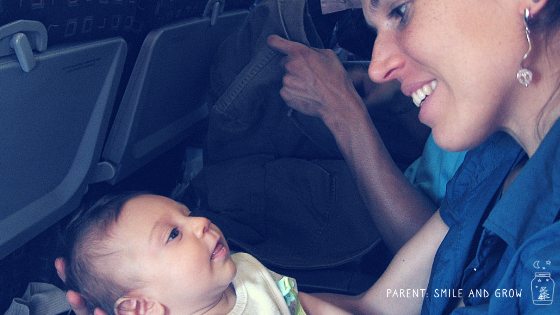
This is mirroring: showing the baby that we understand what he feels, and “explain it to him.”
To understand the effects of this interaction, and how easily we can “stress” our children, watch the video of this experiment.
It shows the reaction of a one-year-old girl when her mother stops responding to her stimuli, showing her an impassive face:
This happens because the functionality/content marked as “Google Youtube” uses cookies that you choosed to keep disabled. In order to view this content or use this functionality, please enable cookies: click here to open your cookie preferences.
This interaction, repeated countless times in the first months and years, teaches newborns:
-
That there is someone who takes care of them and keeps them safe
-
to associate feeling with consequences (and then, slowly, also to the associated word. )
You may also be interested: Attachment, a theory that still says so much today.
The 3 types of stress
To get a little more concrete, newborns can be exposed to 3 types of stress:
- Positive
- Tolerable
- Toxic
#5: Not all stress is bad
That’s the good news! Just like for us adults, a contained dose of stress is very healthy!
It teaches and allows the child to learn how to react to events “alone”.
In short: don’t panic. Your daughter won’t grow up with mental distress if you made her cry a little more tonight, because you were too tired to pick her up.
What matters is the repetitiveness, the continuity.
Problems can arise when we parents have a serious problem, which prevents us from being present for our baby.
I am thinking of depression, abandonment, serious economic problems, abuses, etc.
And so, at the level of society, of community, of family, it is important to be aware of all this in order to be able to HELP if ever there is a need.
The effects of stress on newborns
If you’re wondering, but what happens to the newborn’s brain if he really faces a long period of toxic stress?
For those who want a schematic and synthetic answer:
-
Toxic stress – cortisol is too high – brain formation is affected
-
From a physiological point of view – the child grows with a greater responsiveness to stress
-
On the other hand, from a behavioral point of view, the child has more difficulties to adapt
-
As for learning, it may bring to language, cognitive and socio-emotional deficiencies.
I mean, we’re not off to a good start.
If you wanted the most technical answer, only for those who are interested:
-
Too high cortisol levels reduce neuronal connections in the pre-frontal cortex.
-
this makes it even more difficult for the brain to respond to the reactions of the amygdala, which is “overexcited”
-
the amygdala becomes more responsive and grows more
-
To put it simply: you get more stressed and have fewer neuronal resources to cope with stress. And this is carried with us even in adulthood, in a different way according to the characteristics of each person.
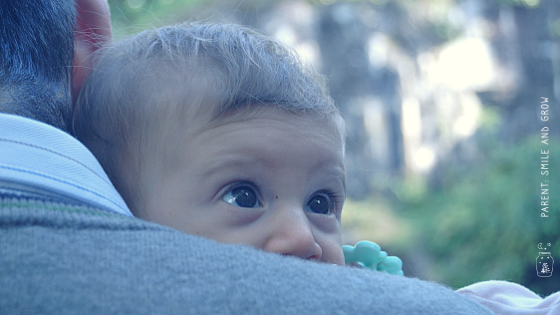
#6 To conclude: in order to better regulate the stress of your baby, surround yourself with calm
The way we adults know how to accompany our children from birth gives valuable tools to know how to cope with life.
(And I speak in a broad sense: not only our children, but the children with whom we have the opportunity to spend time)
Repossessing our role with awareness does not mean adding an additional concern in the (vain) attempt to “do everything right”.
It means, on the contrary, :
-
dare to ask for and offer concrete help without feeling guilty, for example.
-
Learn to take care of ourselves, so that we can then be open and available to respond to the needs of our children.
-
Don’t be afraid to show your vulnerability, your doubts.
Because if we are serene, then we can be present, and “take over our shoulders” the needs of our newborns. To regulate their stress.
And believe me, it’s a great exercise for all the stages of growth that still await you.
Resources and insights
Note: These further readings come either from the books I have personally loved, or from the readings that inspire me and/ or are on my wish list. The links to Amazon.com or amazon.co.uk are affiliates: it means that if you click and decide to make a purchase, I perceive a small commission at no extra cost to you.
-
-
It is from this book that I have drawn most of the information: “[eafl id=”1185″ name=”Why love matters UK” text=”Why love matters”]” (here’s the US edition) delves into the link between relationships and brain development, with real life examples as to the possible consequences on health (in a broad sense of the term). Since it is a bit technical, I recommend it especially if you are interested in deepening the topic.
UK Edition;
-
This is an indispensable guide : “[eafl id=”1317″ name=”The psychology of babies Lynne Murray” text=”The psychology of Babies”]” (here’s the US edition) is full of photographs that illustrate how to interact with children accompanying them in their first development, in delicate stages such as teaching them to fall asleep, leaving them for the first time in kindergarten, and so on; all with a light tone, not guilty but informative. For me, a rare pearl that unfortunately I discovered “late”.
Of the author herself, you can also find
-
Finally,Daniel Siegel’s “Parenting from the Inside out” (here’s the US edition): it leads to a work of “self-analysis” on the link between our history and that of our children.
If you found this reading useful, leave a comment and share !
-
